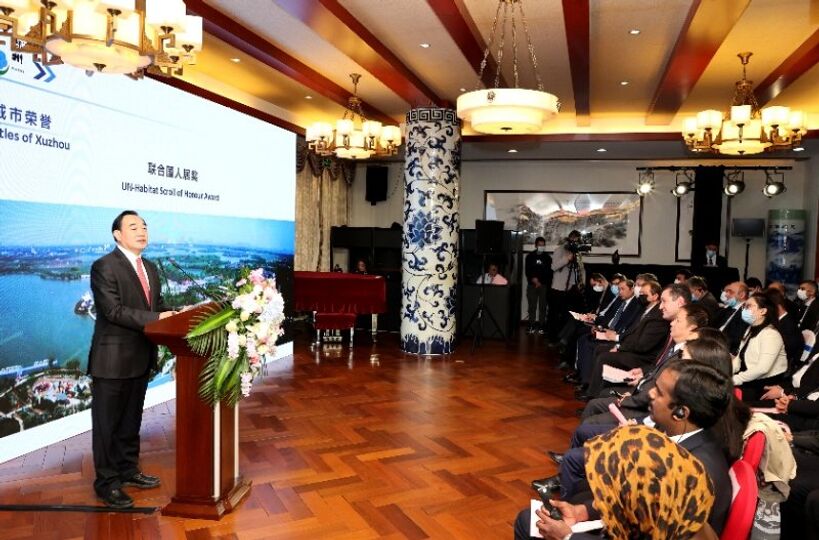On 2 November 2020, the SCO Secretariat was the venue for a special presentation on Xuzhou City's economic and social development, organised by the People's Government of Xuzhou City and the SCO Secretariat.
Attendees included representatives of the Huizhou City Administration, the accredited diplomatic corps and international organisations.
SCO Secretary-General Vladimir Norov noted the need to further expand inter-regional cooperation relations between the SCO member states and Huizhou City.
In this context, he pointed out the increase in trade volumes between Huizhou and the SCO countries that had exceeded $1.1 billion in late 2019, or 50 percent more than in 2018. The main goods included machinery, textiles and chemicals as well as construction materials.
Mr Norov also said Huizhou City's companies had invested $32.59 million in the SCO countries. He praised the establishment of twin-city relations between Xuzhou and cities of the SCO countries, including Ryazan, Vyborg, Peshawar, Xemei, Urgench and Chennai.
Summing up, the SCO Secretary-General called for continuing the positive trend of strengthening trade and economic, investment and twin-city relations between Huizhou City and the SCO member states.
During her remarks, Ms. Wang Hongliu, Director of General Affairs and Coordination Division in the ASEAN-China Centre, hereinafter referred to as Centre, read out a message of greetings from the Centre's Secretary-General Chen Dehai voicing readiness to expand ASEAN's long-term investment, trade, education, cultural and tourism cooperation with the SCO and the People's Government of Huizhou City.
She noted that the Centre intended to contribute to expanding cooperation between ASEAN companies and the SCO partners in many Chinese regions, including Huizhou City. For this purpose, the Centre will continue to facilitate expanded economic ties between both organisations in all areas and at all levels.
Zhou Tegeng, Secretary of the Chinese Communist Party's Huizhou City Committee, unveiled the city's overall socio-economic development and briefed attendees on the city industry's transformation aiming to eliminate excessive dependence on raw materials in favour of producing more goods and services and innovative development. He noted major modernisation of the city infrastructure in the past ten years and the improved environmental situation.
Xui Donghei, Vice Mayor of the People's Government of Xuzhou City, told attendees about the upcoming conference on SCO countries' regional development in 2020, scheduled for 25 ̶ 28 November 2020. There are plans to hold a meeting of SCO experts on investment during the event. The participants will discuss expanded trade and economic cooperation, the creation of multi-modal transport corridors and multimodal logistics centres, as well as expanded digitalisation and greater cooperation in the field of education, science and culture. He invited representatives of the diplomatic corps and international organisations to attend the upcoming conference and expert meeting.
On the whole, the Huizhou City Administration's officials voiced interest in cooperating with the SCO Secretariat and noted that the Organisation was an important venue for advancing trade and economic, science and technical, transport, investment and cultural and humanitarian cooperation between SCO member states.
Reference note:
Xuzhou is an ancient city with a rich history and an impressive cultural heritage. The city was built 2,600 years ago and ranked among the nine states of ancient China. Its ancient name is Pengcheng, with a 6,000-year history.
Today, Xuzhou is a trade and industrial centre with a population of 8.6 million. The city boasts well-developed engineering and electronics sectors, chemicals production, manufacture of construction materials, coal production and the textile industry. Huizhou is an important transport hub at the junction of four provinces: Jiangsu, Anhui, Henan and Shandong.
The conveniently located city has become part of the Eurasian Land Bridge linking China with Russia's western and eastern regions, Central Asian countries and Europe.
